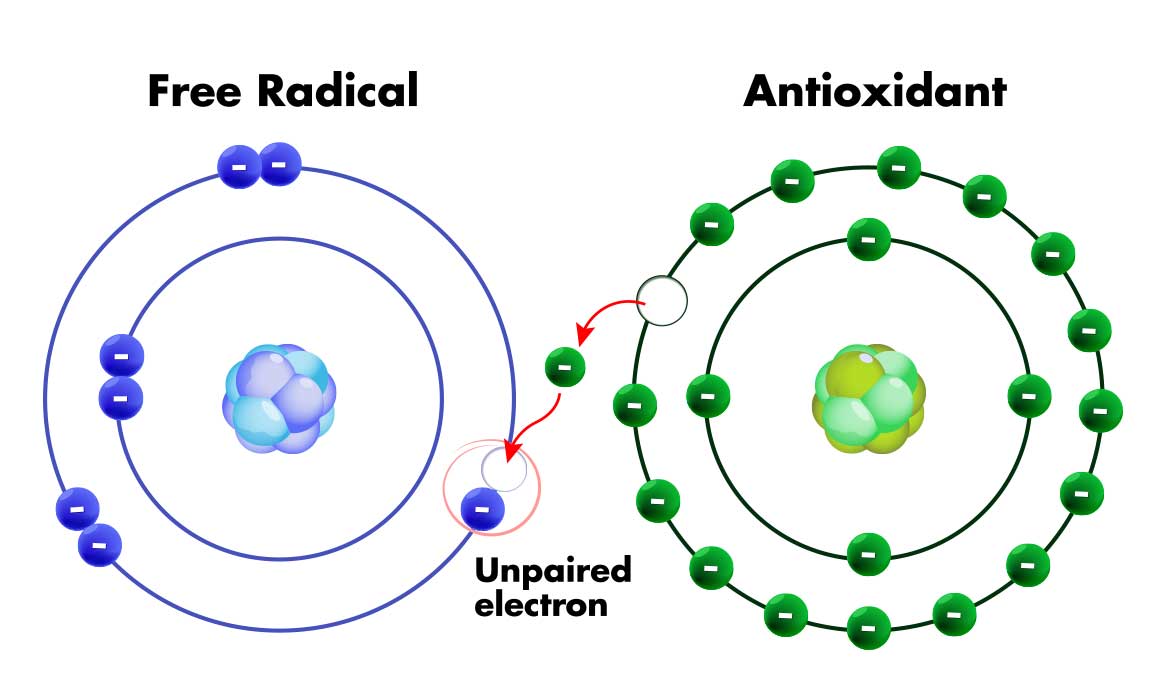Tired? Sluggish? It May be Free Radicals…
What are Free Radicals?
First, our bodies deal with Free Radicals throughout our entire lives and there’s no avoiding them. They are the product of oxidative chemical processes that naturally occur in our bodies and come from the foods we eat, medicines we ingest, even the air we breathe, and the water we drink. A proper balance of free radicals in the body is essential to good health. But when that balance becomes disrupted it can hurt our health and damage our bodies.
At their basic level, Free Radicals are molecules with unpaired electrons. These molecules are inherently unstable and will seek out stable molecules to steal electrons from to restore them to their proper balance. This process causes large-scale chemical reactions in our bodies that cause oxidative stress[1]. To illustrate the damage free radicals can cause look no further than the common apple. Cut open an apple and leave it on the counter. Soon you will notice the freshly exposed white part of the apple begins to turn brown; the exposed inner flesh of the apple is being subjected to oxidative stress, reacting to oxygen in the atmosphere and starting to break down - aka oxidating.

What Causes Free Radicals in the First Place?
The short answer is oxidation naturally occurs as a by-product of metabolic processes brought on by eating, smoking, alcohol consumption, air pollution, and other substances containing toxins we inadvertently ingest. All these things cause oxidating free radicals to form. As our tissues react to all these different elements, molecules lose electrons and oxidation occurs.
How Free Radicals Can Hurt Us
When a Free Radical is created in our body, the molecule is unstable, short-lived, and highly reactive and will immediately seek out another molecule to “steal” an electron and rebalance itself. The victim, the molecule that loses its electron, then seeks out another molecule and repeats the same process. As this “domino” chain reaction progresses, we experience oxidative stress that can lead to cellular damage.
Normally our bodies keep this process in check. But age, diet, and lifestyle can all lead to the presence of too many free radicals in our system. This can cause prolonged oxidative stress, damaging DNA and important molecules that maintain our overall health [2].
For example, the free radical cycle can lead to broken cell membranes, which can alter what normally enters and exits cells. This can damage our cells and manifest itself in a range of health conditions ranging from premature aging, skin damage, persistent lack of energy, and heart disease [3]. One of the most recognizable results of cellular damage is cancer [4] where the DNA in our cells becomes disrupted, cells grow out of control, and form life-threatening tumors that prevent our organs from functioning properly.
Help Protect Yourself with Antioxidants
While oxidization is a natural phenomenon [5] and cannot be prevented, there are things you can do to minimize the danger Free Radicals represent and render them less dangerous to your health and well-being. One of the easiest is to try and ensure your body has the right kind and right amount of antioxidants. [6]
How Antioxidants Work
Antioxidants work by targeting free radicals and neutralizing them by giving them an electron to restore their balance and render them stable. This breaks the chain of free radicals causing damaging oxidative stress. [7]
Your body naturally produces some antioxidants such as alpha-lipoic acid and glutathione. Other examples of antioxidants include vitamins C, an antioxidant not manufactured by the human body and vital for good health. Also, vitamin E, selenium, and carotenoids, such as beta-carotene, lycopene, lutein, zeaxanthin, etc.
Where to Get Antioxidants
The most abundant sources of antioxidants come from plants [8]. Vitamin C from oranges, vitamin E from plant-based oils such as Wheat germ, Sunflower, safflower, and soybean oils; seafood, organ meats, brazil nuts, and dairy products. Berries are a prime source of antioxidants.

Great sources of specific antioxidants include:
- allium sulfur compounds – leeks, onions, and garlic
- anthocyanins – eggplant, grapes, and berries
- beta-carotene – pumpkin, mangoes, apricots, carrots, spinach, and parsley
- catechins – red wine and tea
- copper – seafood, lean meat, milk, and nuts
- cryptoxanthins – red capsicum, pumpkin, and mangoes
- flavonoids – tea, green tea, citrus fruits, red wine, onion, and apples
- indoles – cruciferous vegetables such as broccoli, cabbage, and cauliflower
- isoflavonoids – soybeans, tofu, lentils, peas, and milk
- lignans – sesame seeds, bran, whole grains, and vegetables
- lutein – green, leafy vegetables like spinach, and corn
- lycopene – tomatoes, pink grapefruit, and watermelon
- manganese – seafood, lean meat, milk, and nuts
- polyphenols – thyme and oregano
- selenium – seafood, offal, lean meat, and whole grains
- vitamin A – liver, sweet potatoes, carrots, milk, and egg yolks
- vitamin C – oranges, blackcurrants, kiwifruit, mangoes, broccoli, spinach, and strawberries
- vitamin E – vegetable oils (such as wheat germ oil), avocados, nuts, seeds, and whole grains
- zinc – seafood, lean meat, milk, and nuts
As an alternative to trying to source all of the above or for people who just don’t like fruits and vegetables or can never seem to consume enough to help, there are a wide variety of pre-mixed powdered mixes like LifetimeEssentials’ MegaGreens Extra-Rich Phytonutrient Food Supplement - which aside from being an abundant source of diverse antioxidants - is also a great source for nutritionally valuable phytonutrients, vital trace minerals, vitamins, and more. Additionally, whole-leaf aloe vera juice is also a good source of antioxidants.

A fast Google search will yield dozens of products to choose from. A note of caution: having too many antioxidants can lead to problems, so stay away from high-dose formulations that seem to promise faster results - slow and steady wins the race.
Bottom line? Make sure your body has all the antioxidants it needs to live a long, healthy life. If you have any questions or concerns about you, your diet, and your body, consult with a health professional.
[1] DJ Betteridge, What is oxidative stress?, Department of Medicine, Sir Jules Thorn Institute, The Middlesex Hospital, London, UK., Feb 2000.
[2] Stephanie Liou, Abou[1]t Free Radical Damage, Huntington's Outreach Project for Education, at Stanford, June 2011.
[3] Antioxidants & Heart Health, Cleveland Clinic, clevelandclinic.org.
[4] D Dreher, A F Junod, Role of oxygen free radicals in cancer development, Respiratory Division, Geneva University Hospital, Switzerland, January 1996.
[5] Alugoju Phaniendra, Dinesh Babu Jestadi, and Latha Periyasamy, Free Radicals: Properties, Sources, Targets, and Their Implication in Various Diseases, Department of Biochemistry and Molecular Biology, Pondicherry University, Pondicherry, 605 014 India, July 2015.
[6] V Lobo, A. Patil, A Phatak, and N. Chandra, Free radicals, antioxidants and functional foods: Impact on human health, Department of Botany, Birla College, Kalyan – 421 304, Maharastra, India. March 2010.
[7] Understanding antioxidants, Healthbeat, Harvard Health Publishing, Harvard Medical School, January 2019.
[8] Sofia C. Lourenço, Margarida Moldão-Martins, and Vítor D. Alves, Antioxidants of Natural Plant Origins: From Sources to Food Industry Applications, Instituto Superior de Agronomia, Universidade de Lisboa, Tapada da Ajuda, 1349-017 Lisboa, Portugal, November, 2019

 US Dollars
US Dollars
